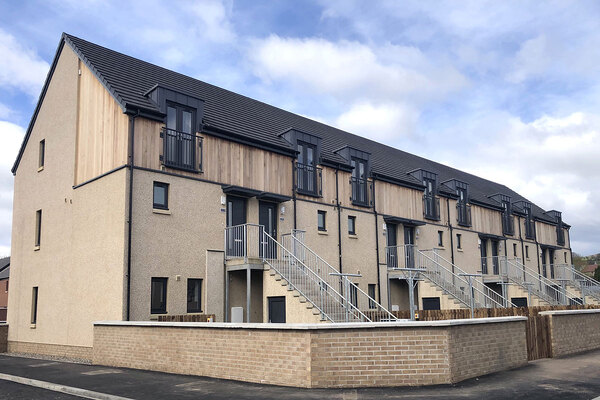Survey: the struggle to meet the need for adult care
A survey by Inside Housing and finance provider Together examines the extent to which councils are struggling to meet the need for adult specialist care
In association with:
![]()
Local authorities have raised alarm bells over the high levels of need for adult specialist care in the UK and their ability to deliver quality services to meet this over the coming months.
An exclusive survey run in partnership with Inside Housing and social housing finance provider Together has laid bare the extent of the problems facing the sector. The survey tested sentiments across a range of councils that had requirements for adult specialist care in their area, to gauge how they were coping with current levels of demand and how they anticipated this to change in the near future.
More than 95% of respondents said demand for adult specialist care – which is care and support for adults with mental health and learning disabilities and other complex needs – in their local authority area had increased in the past two years, with 57% describing the demand as “extremely high”. A further 39%, meanwhile, said demand was “reasonably high”, with 5% describing it as “average”. None of the respondents described demand as “low”.
A sizeable 64% of survey participants said demand for care had “significantly increased” in the past 12 months, followed by 32% who said it had “slightly increased”.
Asked whether they were meeting this demand, 43% said “no, we’re really struggling”. A total of 27% said that while they were failing to meet demand, they were not far off from meeting their target. A quarter said they were meeting demand but admitted it was a challenge. Of the respondents, 5% said they were not only meeting demand but were “excelling”.
Compounding challenges
Challenges were most acutely highlighted when a significant 73% of all respondents said that people were having to travel outside their local authority area to receive adult specialist care.
Of those, 17% of respondents said that people were having to travel more than 50 miles to receive care, with 7% of respondents saying people had to travel more than 40 miles and a further 7% of respondents saying people had to travel more than 30 miles.
Commenting on the results, Alex Bodie, director of community housing and healthcare at Together, who has expert knowledge in specialist care, says: “As expected, the requirement for adult specialist care is high, but the results of this survey have really highlighted the severity of the problem.
“Huge demand, tied in with lack of services available, means that 73% of authorities state that people are travelling outside the local authority to obtain care, with 17% saying people are travelling over 50 miles. This is not acceptable and more needs to be done.”
Community services (46%) and care homes (21%) were the two types of services most in demand. These were followed by ‘in care at home’ (18%), which is when a person has a live-in carer. Supported living was also anecdotally flagged as needed by a number of respondents, as well as property adaptations.
None of the respondents described the quality of their care as “exceptional”, while only 10% said it was “high”. Meanwhile, 23% described it as “above standard”, with a further 51% saying it was “standard”. Ten per cent said it was “below standard” and 5% said it was “poor”.
Several respondents said the quality of their care varied depending on the service. One respondent said: “[There are] variable standards of service, but the main issue is a shortfall in capacity. We need more bespoke specialised supported accommodation, and more local care provision that’s capable of meeting complex needs.”
Others pointed to shortfalls in resource, staffing and funding as reasons for their quality slipping, such as one respondent, who said: “There is huge churn in the staff employed to deliver care services; we hardly ever get the same person.”
Looking at the challenges impacting the quality of care in more detail, 41% of respondents said high costs were the main cause. Adding to this, 77% said access to finance was “difficult”, with a further 10% describing access to finance as “very difficult”. Asked what some of the blockers were to accessing finance for specialist care, 36% said it was down to a lack of understanding of what funding is available. Meanwhile, 23% said there was a lack of specialist lenders with expert care knowledge.
A further 21% of respondents pointed to a lack of lenders operating within this space, as well as the lending process being too complex (also 21%).
On this, Mr Bodie says: “With only 10% describing the quality of care as high, it does appear that keeping hold of quality staff is a real issue, along with lack of funding from government, as well as an understanding of the demands of the sector, both generally and from lenders.
“The results of this survey have further reinforced our strategy to really try and understand this sector. The operators in this sector need a lender that can see the bigger picture and we are proud to support them.”
Asked about the three main challenges to their local authority area in regard to meeting adult specialist care demand, 67% pointed to the high cost of care again, with 56% of participants saying it was the complex integration of health and social care.
A total of 41% said staff retention was a problem, while nearly a third said wider organisational pressures were impacting resources, and 26% said there was a shortage of new specialist staff, while 21% said there was a limited amount of specialist providers to deliver services.
Commenting on the challenges, one respondent said: “To varying degrees, all apply. In short, we have weak local markets, and are working to improve them through housing-based innovations and the development of strategic partnerships to bring better and more flexible care to the city. Some people require individualised solutions, which can take time to realise.”
Another commented on the challenges around supporting mental health services for vulnerable adults. This chimed with a question in the survey which gauged how well councils understood the mental health of those adults requiring specialist care, with a third saying it was limited and “needs to be better”. Five per cent said this was very limited and was something they did not track. Encouragingly, however, 26% said their understanding of mental health among vulnerable adults was “good” and nearly a third said it was “quite high, but could be better”.
Despite the challenges, 13% of respondents said they would not be looking to improve their services within the next 12 months, while a further 41% said this was currently unknown.
For the 46% who said they were intending to improve their services, some respondents anecdotally said they were reviewing their strategic plan, with one saying they were looking at “a new model of delivery”.
Others said they were conducting staffing reviews, with some looking at engagement with more specialist companies.
Recent content in association with Together
How the temporary accommodation crisis is biting
The number of homeless families being housed in temporary accommodation is rising. An Inside Housing survey with Together casts more light on how this is playing out across the country
New assisted living development from Manchester-based Weaver Finch is success due to close alliances during build
A scheme involving social housing funder Together showcases how collaboration makes the building process smoother
What funds do social landlords need to build more homes?
Given the current unstable financial climate how likely is it that the sector will prioritise development this year? A survey by Inside Housing and Together finds out










